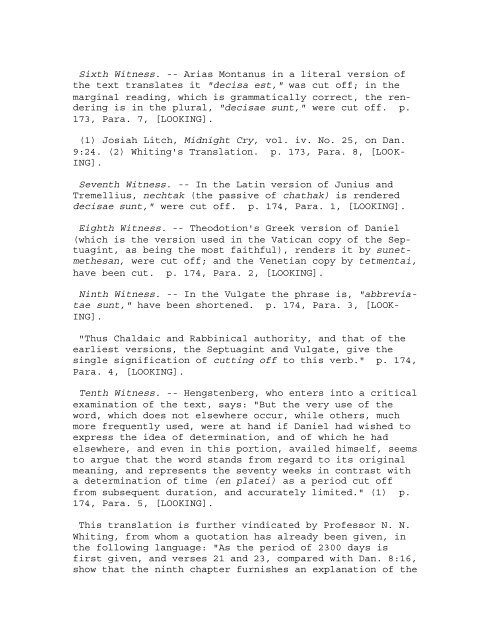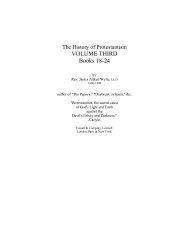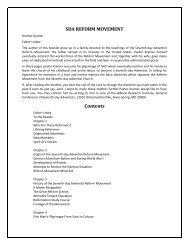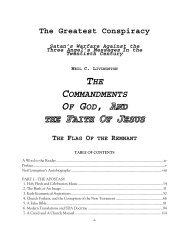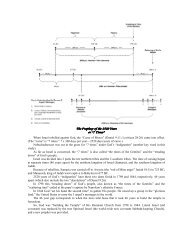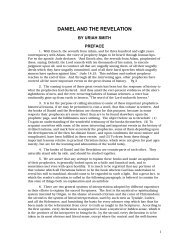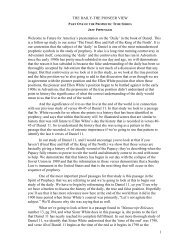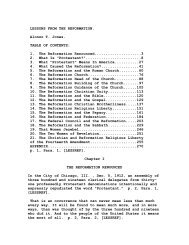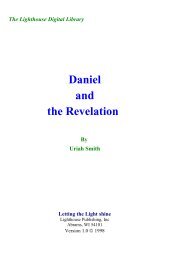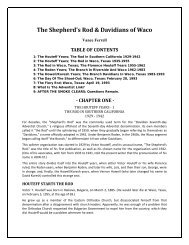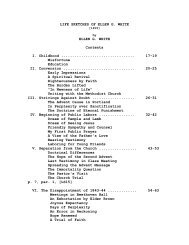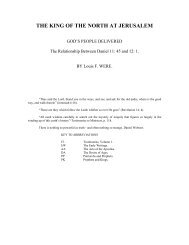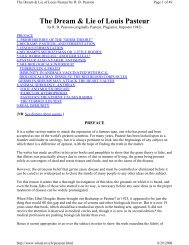LOOKING UNTO JESUS OR CHRIST IN TYPE AND ANTITYPE. BY ...
LOOKING UNTO JESUS OR CHRIST IN TYPE AND ANTITYPE. BY ...
LOOKING UNTO JESUS OR CHRIST IN TYPE AND ANTITYPE. BY ...
You also want an ePaper? Increase the reach of your titles
YUMPU automatically turns print PDFs into web optimized ePapers that Google loves.
Sixth Witness. -- Arias Montanus in a literal version of<br />
the text translates it "decisa est," was cut off; in the<br />
marginal reading, which is grammatically correct, the rendering<br />
is in the plural, "decisae sunt," were cut off. p.<br />
173, Para. 7, [<strong>LOOK<strong>IN</strong>G</strong>].<br />
(1) Josiah Litch, Midnight Cry, vol. iv. No. 25, on Dan.<br />
9:24. (2) Whiting's Translation. p. 173, Para. 8, [LOOK-<br />
<strong>IN</strong>G].<br />
Seventh Witness. -- In the Latin version of Junius and<br />
Tremellius, nechtak (the passive of chathak) is rendered<br />
decisae sunt," were cut off. p. 174, Para. 1, [<strong>LOOK<strong>IN</strong>G</strong>].<br />
Eighth Witness. -- Theodotion's Greek version of Daniel<br />
(which is the version used in the Vatican copy of the Septuagint,<br />
as being the most faithful), renders it by sunetmethesan,<br />
were cut off; and the Venetian copy by tetmentai,<br />
have been cut. p. 174, Para. 2, [<strong>LOOK<strong>IN</strong>G</strong>].<br />
Ninth Witness. -- In the Vulgate the phrase is, "abbreviatae<br />
sunt," have been shortened. p. 174, Para. 3, [LOOK-<br />
<strong>IN</strong>G].<br />
"Thus Chaldaic and Rabbinical authority, and that of the<br />
earliest versions, the Septuagint and Vulgate, give the<br />
single signification of cutting off to this verb." p. 174,<br />
Para. 4, [<strong>LOOK<strong>IN</strong>G</strong>].<br />
Tenth Witness. -- Hengstenberg, who enters into a critical<br />
examination of the text, says: "But the very use of the<br />
word, which does not elsewhere occur, while others, much<br />
more frequently used, were at hand if Daniel had wished to<br />
express the idea of determination, and of which he had<br />
elsewhere, and even in this portion, availed himself, seems<br />
to argue that the word stands from regard to its original<br />
meaning, and represents the seventy weeks in contrast with<br />
a determination of time (en platei) as a period cut off<br />
from subsequent duration, and accurately limited." (1) p.<br />
174, Para. 5, [<strong>LOOK<strong>IN</strong>G</strong>].<br />
This translation is further vindicated by Professor N. N.<br />
Whiting, from whom a quotation has already been given, in<br />
the following language: "As the period of 2300 days is<br />
first given, and verses 21 and 23, compared with Dan. 8:16,<br />
show that the ninth chapter furnishes an explanation of the


